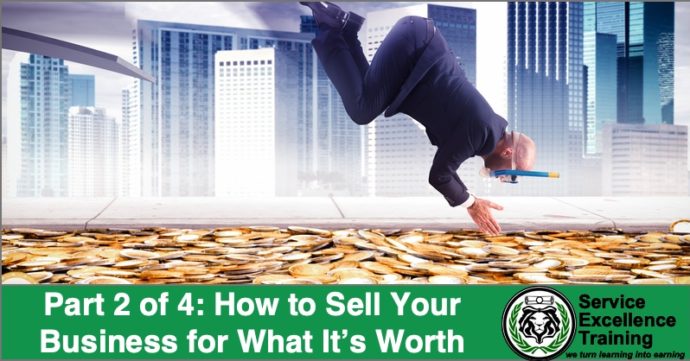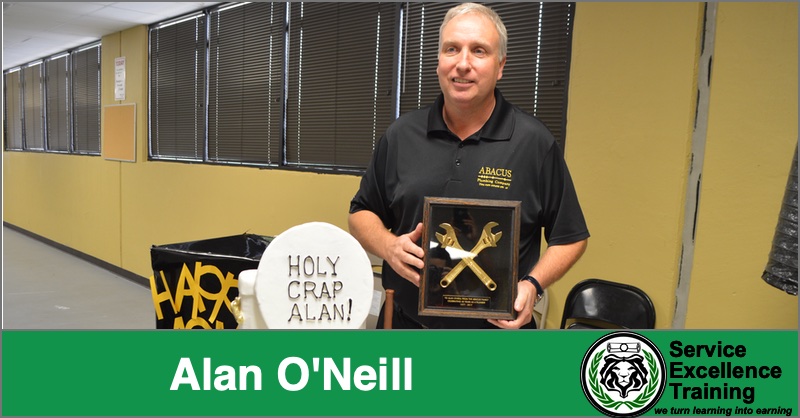Blog
The 3 Methods of Establishing Your Business’s Value
By Todd Liles • The 3 Methods of Establishing Your Business’s Value
Part 2 of 4 of How to Sell Your Business for What It’s Worth
In part 1 of this 4-part series, I shared with you the story of Steve and Rachel Egner. Steve and Rachel received a generous offer on their business. Yet, they said, “No.” They weren’t ready to sell their business because their exit strategy wasn’t fully in place. Today, I’m going to tell you a different story.
Alan O’Neill is a personal friend of mine. He also happens to be a tremendous CEO. Alan started as a plumber in Ireland. In the early 90s, his family won an international lotto that allowed them to come to America as citizens. Alan became a plumber in Houston. Before long, Alan founded Abacus Plumbing and began a new career as an entrepreneur. Under Alan’s leadership, Abacus grew into a mega-million dollar plumbing company. This growth attracted buyers in the market and Alan received his first purchase offer.

The offer came with a lot of excitement, but it also came with a big problem. Alan didn’t know if the offer was good, great, or terrible. This was the first time Alan had ever received an offer on his business, so his experience was limited. Alan had a knowledge gap. This particular knowledge gap could’ve cost him millions in personal earnings. Alan said, “No thank you” to the offer, and began the process of evaluating his business.
Alan found huge value in the process of using an independent evaluator. It gave him clarity on the current value of this business, and what he needed to do to grow the future value of Abacus.
The evaluation acted like a road map to a greater value. Once Alan knew what the market place saw as valuable, he was able to work on increasing those particular assets.

With an independent evaluation in place, Alan was ready to sell his business several years later. By this point in time, his business was worth significantly more than when he had received his first offer. He negotiated a great buyout deal and built a tremendous relationship with the purchaser.
As a matter fact, Alan continued the relationship with the company that purchased the business. He stayed on as an Owner Operator and has received several promotions. His personal and professional growth has led him to run one of the largest Service Contracting groups in America.
Alan’s story comes with a very simple but clear message:
Before you can sell your business for what it’s worth, you have to know what it’s worth.
Your business is worth a real number to the open marketplace. It’s a number that an investor is willing to pay you to hand over the reins.
Do you know with that number is?
Listen, I’m not asking you, “Do you know what you want for your business?”
I’m asking you, “Do you know what your business is actually worth in today’s marketplace?”
I would be willing to bet that the answer is a resounding, “No.” If this was your answer, you’re not alone. Fewer than 5% of all service contractors have ever had their business evaluated by an independent third-party evaluator.
Without an independent evaluation, you truly don’t know what your business is worth.
This means that you’re subject to a potentially bad deal when it comes to selling your business.

3 Methods of Establishing Your Business’s Value
When it comes to establishing the value of your business, there are essentially three methods:
#1: Self-Evaluation
Self-evaluation is the process of the owner determining the purchasing amount of their business. Most owners are not business evaluators. Which means they are going to make some major mistakes when self-evaluating. The most common mistake is overvaluing the purchase price of their business based on emotion.
This happens because of the personal time and energy an owner has put into the business. This time and energy creates emotions, and these emotions trick you into thinking you have something more valuable than it actually is.
However, a potential buyer isn’t going to value your personal sacrifice. I’m not saying that they don’t respect it. I believe they do respect your hard work and effort. But no matter how much they respect your effort, the buyer values the potential upside of purchasing your business. Which means, the buyer is looking for a return on investment. Your pain and sacrifice, unless it has actually increased the value of the business, isn’t worth a premium.
#2: Buyer Evaluation
A buyer is looking for the best deal possible. This is what smart buyers do. Let me make this super clear to you, if you are putting your business in the marketplace to be purchased, then you are putting yourself out there for smart and sophisticated buyers. These buyers will do their research on your company, and they will determine what fair market value is to them. And, they are going to try to negotiate to purchase your business for below that value. That does not make them unethical. It makes them smart. It’s what you should do if you’re looking to buy a business.
If you want to go to the negotiating table well-armed, then you had better do an independent evaluation of your business in advance of the offer.
#3: Independent Evaluation
An independent evaluation of your business is done by a third-party. It’s a detailed examination and breakdown of your business’s current value. A good evaluation should be unbiased. It should state the current value of the company to the open marketplace. This number serves as a baseline for the owner and the buyer. It’s not a guaranteed number that you’ll receive when you sell your business. However, it is a benchmark.
Once you have your independent evaluation, you’ll be better armed to make the important decision of:
- Do I sell?
- Do I continue to build the value of my business?
This type of knowledge truly is power!
Allow me to repeat the number I shared with you earlier. Fewer than 5% of all contractors have had their business independently evaluated. This means they’re operating without understanding the value of their business. Which means they’re not prepared to sell. Yet, businesses are still bought and sold without an independent evaluation. This rarely works out in the favor of the original business owner.
You never want to put the odds against you. If you’re considering selling your business, and every business owner reading this should be considering selling their business, then you need to have an evaluation done on your business. Don’t be the victim of a bad deal. Start your evaluation process today and be prepared for the future.
DID YOU KNOW? We are Business Consultants and Can Help You Build Your Business Plan?
If you would like to have a Free Consultation on the State of Your Business, then complete the form below. We will get in contact with you to schedule your free consult within 24 business hours.
What SETs Us Apart?
Proactive Business Plans
A proactive business is a successful business. That's why our team takes the time to make sure every client has a proactive, not reactive, business plan. Our strategies make your business run more smoothly and profitable.
Proven Results
Our training services help businesses identify and achieve their key performance indicators (KPIs). Whether it's increased revenue or higher satisfaction rates, our methods allow you to see immediate and continued results.
Personalized Training
Our team of experts works hard to make sure your business gets personalized training. We'll work with your team one-on-one or in group settings to set and achieve your business goals. We develop training based on your goals!
Prioritizing People
We believe that people are the most valuable asset. We strive to provide outstanding benefits, life balance, leadership, and support to our team. We believe in helping people reach their greatest level of growth, contribution and satisfaction.

Trusted By
Business Ignition
SPARK
Classroom Training
Resources
Company

Join our newsletter











